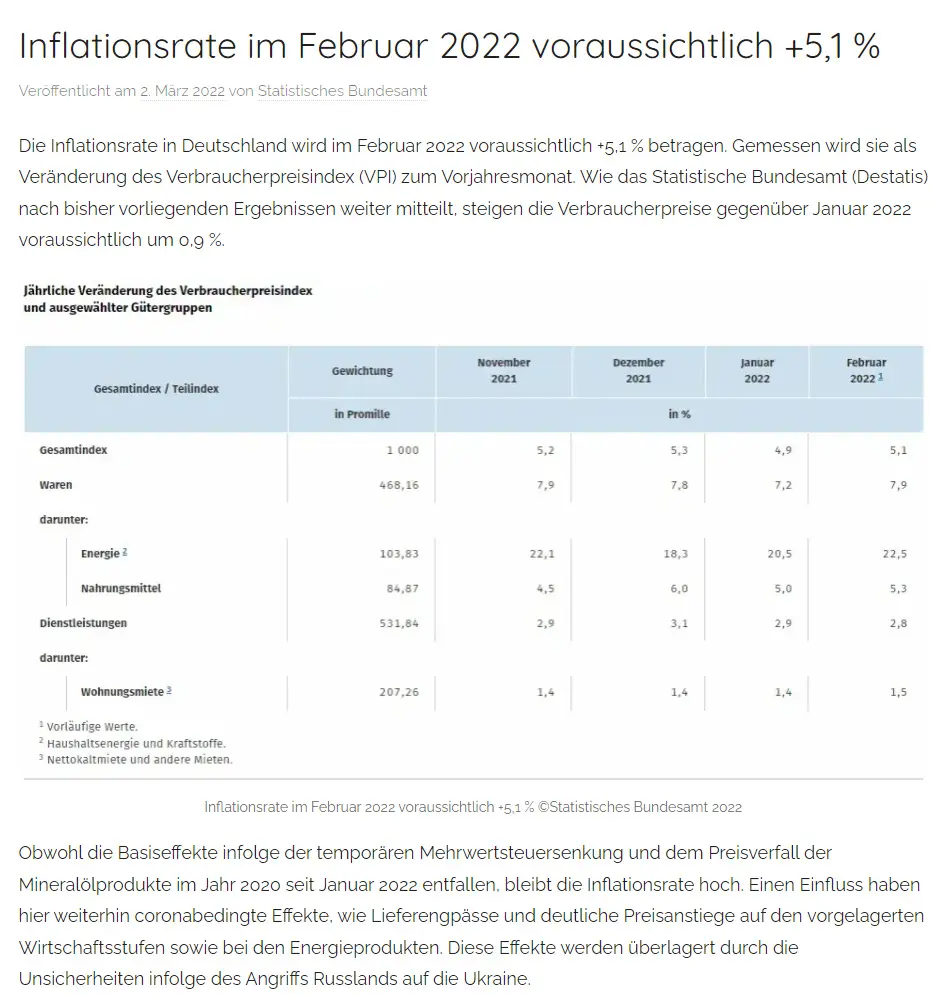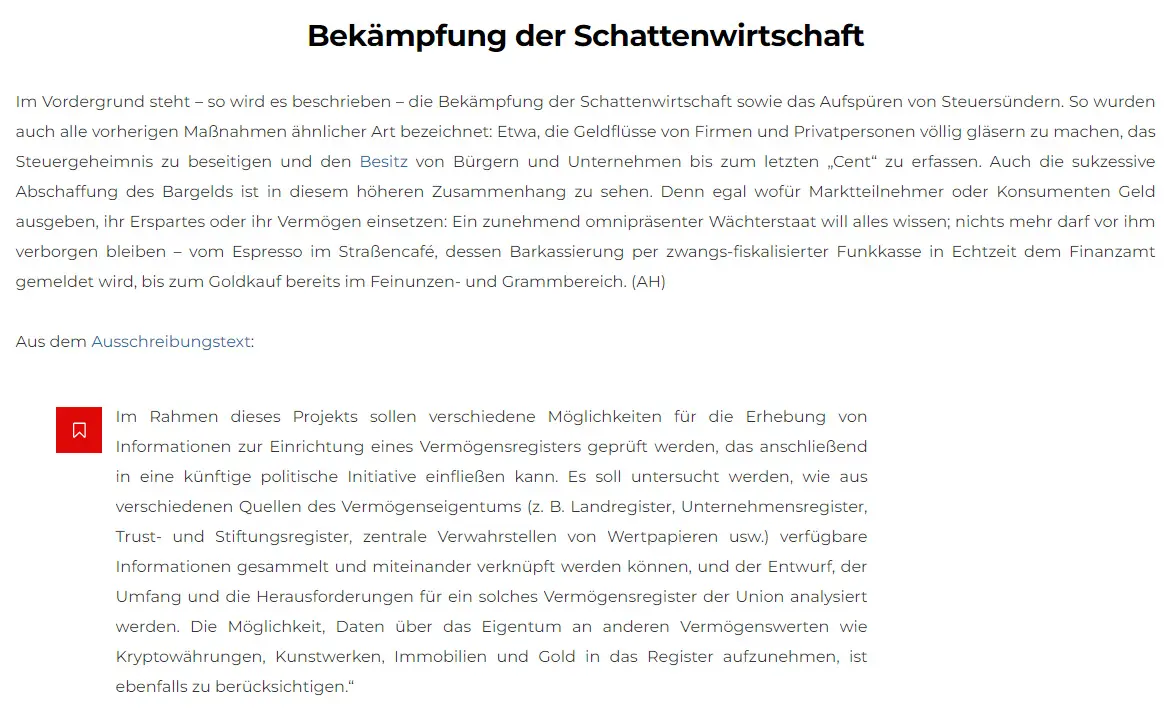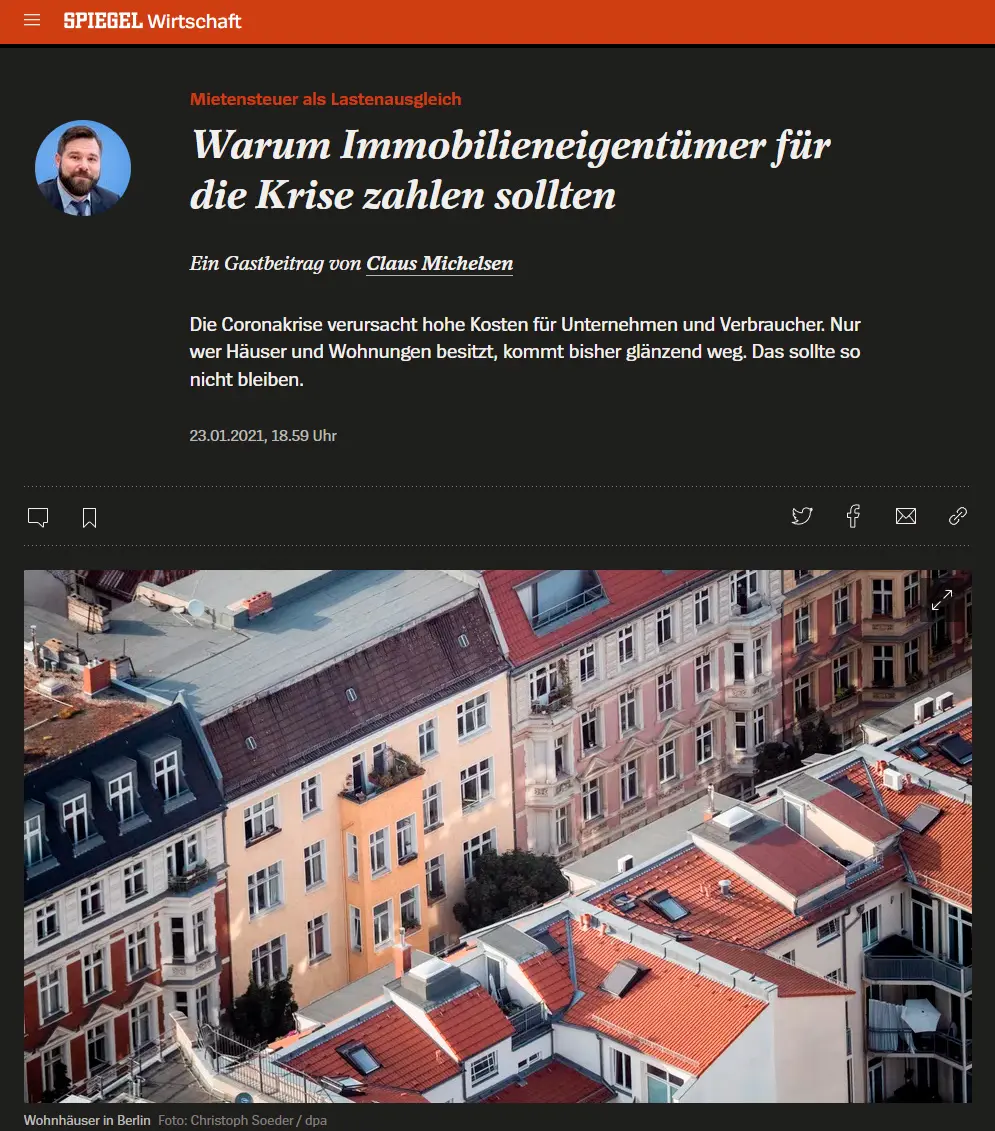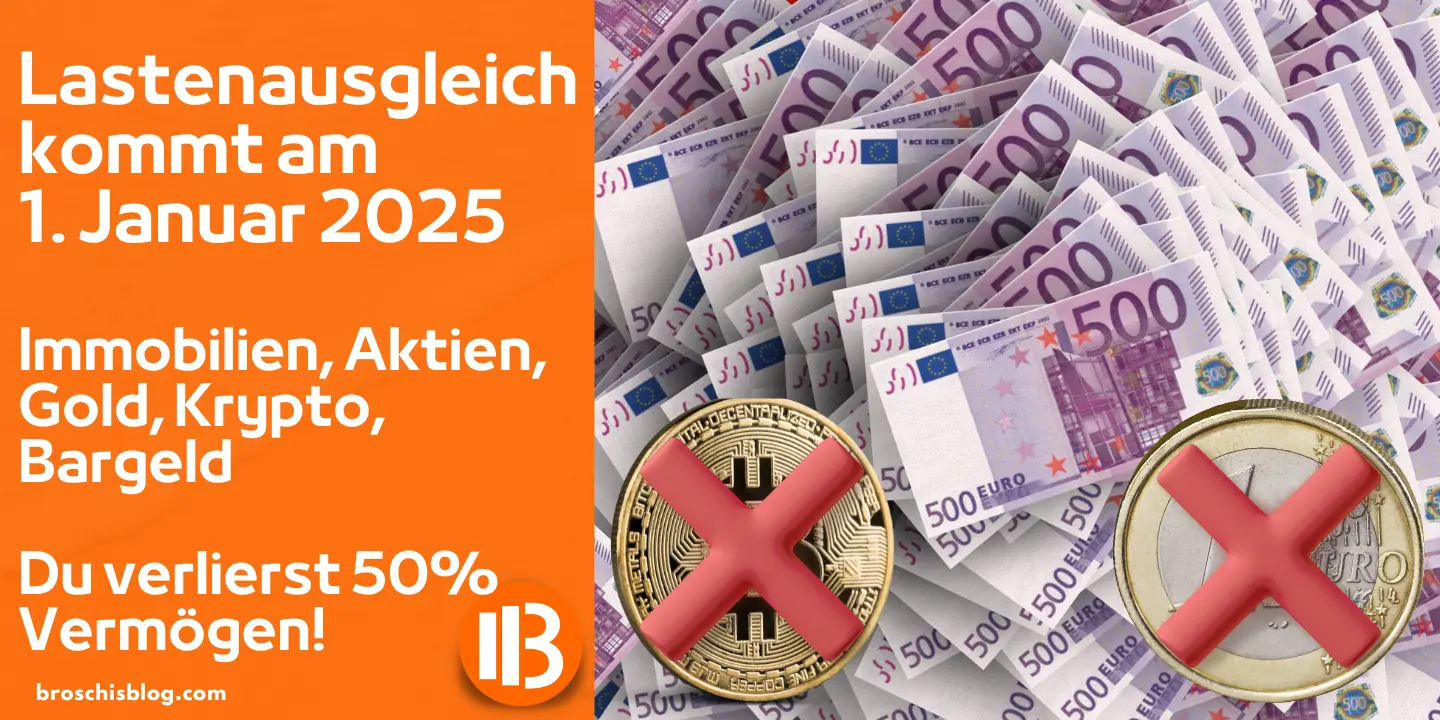On January 1, 2025, a new wealth redistribution policy will come into effect, and you will lose half of your assets?! This applies to real estate, stocks, crypto (Bitcoin), gold, as well as your cash in the bank. Half of it will simply disappear! Is that really true? And why exactly on January 1, 2025, and how can you protect yourself from it? Here’s the information about it:
Currently, debt in Germany is skyrocketing to unprecedented levels.
In Germany, debt has risen sharply in recent years. In addition to various challenges such as the refugee crisis, the COVID-19 pandemic, and the current geopolitical situation, the effects of the climate crisis are also increasingly being felt. These developments have brought significant financial burdens to the country.
The COVID-19 pandemic, in particular, has incurred considerable costs. In 2020 alone, about 130 billion euros were spent to deal with the crisis. In 2021, Germany even recorded a deficit of 215 billion euros, further exacerbating the financial situation. Additionally, at the beginning of 2022, a fund of 100 billion euros for the military was announced, which means additional expenses.
These financial burdens are leading to increasing debts and raise questions about how the future budgetary situation can be managed. It is important for the government to develop strategies to reduce debts in the long term and ensure sustainable financial stability. It remains to be seen how the economic situation will develop further and what measures will be taken to manage the debt burden.
Current debts in Germany
The current debts in Germany can constantly change as they are influenced by various factors such as fiscal policies, economic conditions, and other financial decisions. As of my knowledge in September 2021, Germany’s total debt stood at approximately 2.4 trillion euros. This includes debts of both the federal government and the states (Länder), municipalities, and other public institutions.
It is important to note that high debts are not necessarily negative as long as they are sustainably managed and used for productive purposes. Germany’s debt-to-Gross Domestic Product (GDP) ratio, which represents the ratio of debt to GDP, was around 70 percent at the time of my knowledge, which is relatively low compared to other European countries.
However, the COVID-19 pandemic has led to significant additional expenditures to mitigate the economic impacts and provide support for businesses, workers, and healthcare. This resulted in a temporary deterioration of the fiscal situation and increased indebtedness. It remains to be seen how the debt trajectory will evolve in the coming years, as it depends on economic recovery and political decisions.
Germany's national debt

The additional costs incurred by the mentioned challenges have indeed been mostly financed through borrowing, meaning that the country’s debt is continuously increasing. It’s important to note that these debts will ultimately need to be repaid.
The current high inflation may temporarily help alleviate the burden of debt, as currency devaluation reduces nominal debt. However, this is not a long-term solution, as sustained high inflation can lead to significant economic problems.
The rising prices of gasoline and energy serve as examples of how increasing costs and burdens can also affect citizens. High energy prices can lead to increased costs for consumers and financial strain. It’s understandable that this sparks discontent among people and leads to protests.
It’s of great importance that the government handles public finances responsibly and develops strategies to manage the debt burden in the long term. This can be achieved through sustainable fiscal policies, structural reforms, and promoting economic growth. Balanced and long-term-oriented financial policies are crucial to minimize burdens on citizens and establish a solid financial foundation.

Although the base effects resulting from the temporary reduction in value-added tax and the price decline of mineral oil products in 2020 have ceased since January 2022, the inflation rate remains high. Continuing to influence this are COVID-related effects such as supply shortages and significant price increases at upstream economic stages as well as for energy products. These effects are compounded by uncertainties resulting from Russia's attack on Ukraine.
onlinemarktplatz.de
Wealth tax - Equalization of burdens
Furthermore, in every crisis, there are always losers but also winners! According to the Left, the middle class and the poor have suffered greatly in the crisis while the rich have become even richer. Therefore, they now want to implement a new wealth tax in the form of a burden equalization.
In order to carry out a wealth tax through burden equalization, it is necessary to first know how much wealth each individual has, and for that purpose, the introduction of a Europe-wide wealth register is planned.
And as luck would have it, the EU wants to introduce this wealth register and has commissioned a feasibility study in 2021 on how this wealth register can be implemented and what factors will be taken into account!
The official justification, as always, is to combat corruption and money laundering?!

As part of this project, various methods for gathering information to establish an asset register will be examined, which can then be incorporated into a future political initiative. It will explore how available information from various sources of asset ownership (such as land registers, company registers, trust and foundation registers, central securities depositories, etc.) can be collected and linked together, and the design, scope, and challenges of such a Union asset register analyzed. The possibility of including data on ownership of other assets such as cryptocurrencies, artworks, real estate, and gold in the register should also be considered.
business-leaders.net
So if you thought that this redistribution of burdens only affects real estate, like it used to… then you were mistaken! It really affects everyone! There are some doomsayers who have been predicting this redistribution of burdens for a while now, and they also say: oh, you absolutely must sell your real estate now to protect yourself from the redistribution of burdens, and you just invest the money in gold and cryptocurrencies!
But what’s the point of all this??? If you maybe quickly sell your single-family house now because you’re afraid of the redistribution of burdens and you get 500,000 euros for your house, and then you buy gold or Bitcoin for that, your financial situation still won’t change! Exactly the same values will soon be in the asset register, and then you have to pay your levy on them!
It doesn’t matter whether you had the real estate or whether you had cryptocurrency like Bitcoin! Even hiding your assets in some foundations wouldn’t help, because all trust and foundation registers are also supposed to be checked. Here the question arises, what happens if this asset register is hacked? And once all the assets are registered in this asset register, then the levy can be implemented, and the redistribution of burdens of 1925 should serve as a model for this.

Millions of people with German citizenship wandered around Germany after the end of World War II. Lastenausgleichsgesetz, implemented to compensate for losses incurred during World War II, was enacted partly for their benefit. (picture alliance / dpa / CTK_Photo)
deutschlandfunk.de
And this law on compensation from 1952 aimed to provide financial compensation to Germans who suffered property damage as a result of World War II, and this redistribution was achieved by requiring those who retained substantial assets to pay a wealth tax, primarily affecting real estate.
Overall, the wealthy had to relinquish 50% of their assets at that time, secured by the registration of a mortgage on the property. And if you couldn’t pay this wealth tax, you lost your property, and that’s exactly what they want to do again now!
This wealth tax is intended to be paid by those who did not lose anything in the last crisis or may have even gained something, and it is intended to benefit those who mainly lost something in this crisis.
However, there is again a lot of hostility towards the wealthy, as you can read in the Spiegel article by Klaus Michelsen. In this article, the author writes:
Those who built up real estate assets before the crisis are hardly worse off after the crisis, often even better off! Property owners are the crisis winners, and they must be involved in covering the costs of the crisis through wealth redistribution.

Quote from vermietertagebuch.com: "Yes, and then I once sent the following message to Mr. Michelsen. Dear Mr. Michelsen, pure envy speaks from you. You are acting as if property owners were to blame for the last crisis and even enjoyed it. But that's complete nonsense. Because anyone who buys property and builds wealth with it always improves their financial situation, whether we have a crisis or not. That's a sign of financial intelligence. So instead of whining about the evil property owners and wanting to blame them for something they can't control, they should rather consider how more people can invest in real estate to protect themselves from such a crisis.
Some politicians openly discuss introducing a 30% wealth tax, but if the current problems persist and debts continue to rise, 50% cannot be ruled out. And why should this happen exactly from January 2025? If one wants to implement a wealth tax, one naturally needs to know how much wealth is actually present, and with real estate, this is of course very difficult.
How do you even measure the value of a property? Do you take the purchase price at that time? What about appreciation or do you take the current purchase price from “immoscout”?
Example: Purchase price of the property is 2.8 million. Current value is 4.9 million. Wealth difference of 2 million euros. You see, this valuation is a bigger problem, but as luck would have it, our government also has a solution ready. In Germany, the property tax is now being reformed, and for this, all property owners must provide new data to the tax office. With this data, the tax office can calculate the exact value of the property and then levy the new property tax on it!
By January 1, 2025 at the latest, everything should be fixed, and by this time, the value of the property will truly be completely determined. If you already have the property data by chance, you can also directly enter everything into the asset register and then introduce the wealth tax on it!
Furthermore, until 2025, there is still enough time to find out who among us has bought how much gold and who has invested in which cryptocurrency, and the same applies to companies. Companies also have a certain value that can be taxed with the wealth tax.
For the determination of the company value, the market value of the company is then taken, i.e., the last annual profit is multiplied by 13.75, and the value that comes out can then be taxed. This means a company with an annual profit of 1 million euros x 13.75, and that would be 6,875,000 million euros at a wealth tax rate of 50%. And these 50% or 30% sound extremely high, especially if you had to pay them all at once.
Many entrepreneurs and property owners could not afford that, and then the entrepreneurs would have to declare bankruptcy, and property investors would have to sell their properties. Therefore, it would be handled here just like back then during the Lastenausgleich (equalization of burdens), which was actually a requirement from the Federal Court of Justice back in 1952, that no forced sales due to tax burdens should arise from this wealth tax.
Therefore, this wealth tax will most likely be deferred for 30 years, just like back then, and it can then be paid annually at 1.6%. The advantage for the state is also that this deferral can be directly linked to the residence, meaning if someone wants to flee Germany, then this deferral is lifted, and you have to pay the entire amount immediately, and consequently, a so-called new barrier is erected. So nobody can just leave the country easily.
This is not new either… as already known from the exit tax.
- The next question: who does this wealth tax actually affect? Does it affect everyone who has assets within the EU, or does it only affect wealthy individuals who also live within the EU? You’ll find out all of that in the video.
Lastenausgleich: General Explanation
The term “Lastenausgleich” generally refers to measures taken to distribute financial, economic, or social burdens more equitably. It is a form of resource or obligation redistribution aimed at offsetting inequalities and ensuring fair participation of all citizens in societal costs and obligations.
Lastenausgleich can be applied in various contexts, such as after wars, natural disasters, or economic crises. The goal is to support those who have been particularly burdened by such events while demanding financial or material support from those who are capable of contributing more.
The specific measures and scope of Lastenausgleich can vary from country to country and situation to situation. It may involve tax increases for the wealthy, social benefits for the needy, government subsidies, or other redistribution instruments. The aim is to create a fairer society and achieve a more balanced distribution of resources and burdens.
It is important to note that Lastenausgleich can also be controversial, as it may entail restrictions or financial burdens for certain groups. Implementing Lastenausgleich requires careful planning, political decisions, and consideration of the impact on the economy and society as a whole.
Questions and Answers (FAQ) about the Lastenausgleich 2025
What is the Lastenausgleich?
The Lastenausgleich was a wealth tax imposed in Germany after World War II to finance the costs of reconstruction. The tax was paid by those who possessed wealth of more than 500,000 Reichsmarks during the war and post-war period.
Is a Lastenausgleich planned for 2024?
No, there is no Lastenausgleich planned for 2024. The Lastenausgleich Law of 1952 was amended in 2019. The amendment pertains to the calculation and collection of Lastenausgleich as well as the criteria for contribution obligations. The amendment will come into effect on January 1, 2024.
The amendment to the Lastenausgleich Law is merely intended to make the Lastenausgleich fairer and more efficient. However, there is no indication that the amendment is intended to lead to expropriations.
The federal government has repeatedly emphasized that it does not plan any expropriations. Opposition parties have also spoken out against expropriations.
Therefore, it is highly unlikely that property owners will be expropriated on January 1, 2024.
Is a Lastenausgleich planned for 2025?
No, currently there is no Lastenausgleich planned in Germany. However, there are often calls from individuals, parties, and institutions for a wealth tax to finance the costs of climate change or other social issues.
What would be the effects of a Lastenausgleich in 2025?
The effects of a Lastenausgleich in 2025 would be difficult to estimate. However, it is possible that the levy could lead to a redistribution of wealth and a decrease in economic output.
Who would pay the Lastenausgleich in 2025?
The Lastenausgleich in 2025 would likely be paid by those who possess wealth exceeding a certain threshold. This threshold could be based on income, assets, or another measure.
How would the Lastenausgleich be collected in 2025?
The Lastenausgleich in 2025 could be collected in the form of a one-time levy or an annual tax. The amount of the levy or tax would vary from person to person.
Is a Lastenausgleich fair in 2025?
Will there be a Lastenausgleich in 2024?
No, there will be no Lastenausgleich in 2024. The federal government has confirmed this multiple times.
The rumor that there will be a Lastenausgleich in 2024 is based on several factors:
- The planned restructuring of the property tax. Property tax is a tax paid by owners of land and real estate. The restructuring is intended to ensure that property tax is levied more fairly.
- Rising property prices. Property prices in Germany have risen sharply in recent years. This has led to an increasing number of people owning assets in the form of real estate.
- The COVID-19 pandemic and the Ukraine war. The COVID-19 pandemic and the Ukraine war have exacerbated social inequality. Some people are therefore calling for a wealth tax to distribute the burdens of these crises more fairly.
However, the federal government has clarified that there are no plans for a Lastenausgleich. The restructuring of the property tax is intended to ensure that property tax is levied more fairly, not to levy a wealth tax.
The federal government has also emphasized that there are no plans to expropriate property owners. Expropriation is an infringement of property rights and can only occur in exceptional cases.
In summary, there will be no Lastenausgleich in 2024. The federal government has confirmed this multiple times. The restructuring of the property tax is intended to ensure that property tax is levied more fairly, not to levy a wealth tax. Expropriation of property owners is not planned.
Will there be a Lastenausgleich in Germany?
In short: No, there will be no Lastenausgleich in Germany.
The federal government has confirmed this multiple times. The Lastenausgleich was a wealth tax imposed in Germany after World War II to finance the costs of reconstruction. The tax was paid by those who possessed wealth of more than 500,000 Reichsmark during the war and post-war period.
The last Lastenausgleich was paid in 1995. Since then, there have been no plans for another Lastenausgleich.
The rumors that there will be a Lastenausgleich in 2024 are based on several factors, including:
- The planned restructuring of the property tax. Property tax is a tax paid by owners of land and real estate. The restructuring is intended to ensure that property tax is levied more fairly.
- Rising property prices. Property prices in Germany have risen sharply in recent years. This has led to an increasing number of people owning assets in the form of real estate.
- The COVID-19 pandemic and the Ukraine war. The COVID-19 pandemic and the Ukraine war have exacerbated social inequality. Some people are therefore calling for a wealth tax to distribute the burdens of these crises more fairly.
However, the federal government has clarified that there are no plans for a Lastenausgleich. The restructuring of the property tax is intended to ensure that property tax is levied more fairly, not to levy a wealth tax.
The federal government has also emphasized that there are no plans to expropriate property owners. Expropriation is an infringement of property rights and can only occur in exceptional cases.
In summary, there will be no Lastenausgleich in Germany. The federal government has confirmed this multiple times. The restructuring of the property tax is intended to ensure that property tax is levied more fairly, not to levy a wealth tax. Expropriation of property owners is not planned.
What will homeowners face in 2024?
From January 1, 2024, Germany will enforce the new Building Energy Act (Gebäudeenergiegesetz or GEG), which tightens requirements for new heating systems. According to the law, new heating systems must operate with at least 65 percent renewable energy. This applies to all heating systems installed from this date, regardless of the building’s size or heating demand.
For homeowners, this means that when replacing heating systems in the coming years, they must switch to a renewable energy-based heating system. Possible alternatives to fossil fuels include heat pumps, solar thermal systems, or hybrid systems combining heat pumps and gas heating.
Heat pumps extract heat from the environment to warm water, making them particularly environmentally friendly and efficient.
Solar thermal systems utilize solar energy to heat water, serving as a good complement to heat pumps or as standalone heating systems.
Hybrid systems combine a heat pump with a gas or oil heating system. This can be a viable solution for high heating demands or situations where the heat pump alone cannot provide sufficient warmth throughout the year.
The federal government offers financial assistance to homeowners transitioning to renewable energy-based heating systems. For example, there is a subsidy of up to 45 percent for installing a heat pump.
Other Changes in the GEG
In addition to the new heating system requirements, the GEG includes other changes affecting homeowners, such as:
Mandatory energy renovations for existing buildings constructed before 1978. Increased requirements for building insulation. Mandatory installation of smart meters capable of measuring and controlling energy consumption.
Will property owners be expropriated on January 1, 2024?
No, property owners will not be expropriated on January 1, 2024. The federal government has confirmed this multiple times.
The rumor of expropriation of property owners in 2024 is based on several factors, including:
- The planned restructuring of property tax. Property tax is a tax paid by owners of land and real estate. The restructuring aims to ensure fairer collection of property tax.
- Rising property prices. Property prices in Germany have risen significantly in recent years, leading to an increase in the number of people owning property.
- The COVID-19 pandemic and the Ukraine war. The pandemic and the war have exacerbated social inequality, leading some people to call for a wealth tax to distribute the burdens of these crises more fairly.
However, the federal government has clarified that there are no plans for expropriation. The restructuring of property tax aims to ensure fairer collection of property tax, not to levy a wealth tax.
The federal government has also emphasized that expropriation of property owners is not planned. Expropriation is an infringement of property rights and can only occur in exceptional cases.
In summary, there will be no expropriation of property owners in 2024. The federal government has confirmed this multiple times. The restructuring of property tax aims to ensure fairer collection of property tax, not to levy a wealth tax. Expropriation of property owners is not planned.
The amendment to the Lastenausgleichsgesetz (Lastenausgleich Act) of 2019 has no impact on the expropriation of property owners. The law provides for compensation for individuals who were harmed during or after the war in Germany. These compensations are paid from the federal budget and are unrelated to the wealth of property owners.
How can I protect my house from Lastenausgleich?
There is no way to protect your house from Lastenausgleich because there will be no Lastenausgleich. The federal government has confirmed this multiple times.
The rumors of a Lastenausgleich in 2024 are based on several factors, including:
- The planned restructuring of property tax. Property tax is a tax paid by owners of land and real estate. The restructuring aims to ensure fairer collection of property tax.
- Rising property prices. Property prices in Germany have risen significantly in recent years, leading to an increase in the number of people owning property.
- The COVID-19 pandemic and the Ukraine war. The pandemic and the war have exacerbated social inequality, leading some people to call for a wealth tax to distribute the burdens of these crises more fairly.
However, the federal government has clarified that there are no plans for a Lastenausgleich. The restructuring of property tax aims to ensure fairer collection of property tax, not to levy a wealth tax.
The federal government has also emphasized that expropriation of property owners is not planned. Expropriation is an infringement of property rights and can only occur in exceptional cases.
In summary, there will be no Lastenausgleich in 2024. The federal government has confirmed this multiple times. The restructuring of property tax aims to ensure fairer collection of property tax, not to levy a wealth tax. Expropriation of property owners is not planned.
If you are concerned about your assets, you should consult with a lawyer for advice.
What does Lastenausgleich mean for property owners?
The Lastenausgleich is a wealth tax that was levied in Germany after World War II to finance the costs of reconstruction. The tax was paid by those who owned wealth of more than 500,000 Reichsmarks during the war and post-war period.
For property owners, the Lastenausgleich meant that they had to take out a compulsory mortgage on their property. This mortgage was typically 20% of the value of the property, and repayment of the mortgage was spread over 30 years.
The Lastenausgleich was a controversial measure. Critics argued that it was unfair, as it mainly burdened the middle class. Supporters argued that it was necessary to finance the costs of reconstruction.
The Lastenausgleich was abolished in 1995.
What does the Lastenausgleich mean for property owners in 2023?
In 2023, there is no Lastenausgleich in Germany. The federal government has confirmed this on multiple occasions.
The rumors of a Lastenausgleich in 2024 are based on several factors, including:
- The planned restructuring of property tax. Property tax is a tax paid by owners of land and real estate. The restructuring is intended to make property tax collection fairer.
- Rising property prices. Property prices in Germany have risen sharply in recent years, leading to an increase in the number of people owning wealth in the form of real estate.
- The COVID-19 pandemic and the Ukraine conflict. The COVID-19 pandemic and the Ukraine conflict have exacerbated social inequality. Some people are calling for a wealth tax to distribute the burdens of these crises more fairly.
However, the federal government has clarified that there are no plans for a Lastenausgleich. The restructuring of property tax is intended to make property tax collection fairer, not to introduce a wealth tax.
The federal government has also emphasized that there are no plans to expropriate property owners. Expropriation is a violation of property rights and can only occur in exceptional cases.
In summary, there is no Lastenausgleich for property owners in Germany in 2023. The federal government has confirmed this on multiple occasions. The restructuring of property tax is intended to make property tax collection fairer, not to introduce a wealth tax. There are no plans to expropriate property owners.
Can the German state access private assets?
Yes, the German state is allowed to access private assets in certain cases. This is regulated in Article 14, Paragraph 3 of the Basic Law.
Accordingly, property may only be expropriated by law or on the basis of a law. Compensation must be made “in a just balance between the public interest and the interests of those affected.”
Expropriation is an interference with property rights and may therefore only occur in exceptional cases. This is the case when it serves the public interest.
Examples of expropriation include:
Construction of roads, bridges, or other infrastructure projects Construction of housing for social housing Protection of nature and the environment Expropriation of companies as part of privatizations
Expropriation of real estate is relatively rare in Germany. However, in recent years, there have been some cases where property owners have been expropriated.
For example, in Berlin in 2021, a housing company was expropriated to create apartments for social housing. In Munich, in 2022, a company was expropriated to acquire land for airport expansion.
Expropriation of real estate is a controversial topic. Critics argue that it is unfair as it restricts the rights of private individuals. Advocates argue that it is necessary to ensure the public good.
Conditions for expropriation
For an expropriation to be permissible in Germany, the following conditions must be met:
There must be a law or an administrative act based on a law that provides for expropriation. The expropriation must serve the public interest. Compensation must be made “in a just balance between the public interest and the interests of those affected.”
Compensation
Compensation for expropriated property must be adequate. The amount of compensation is usually determined by an independent appraiser.
Compensation can be made in the form of money, assets, or a combination of both.
Objection to expropriation
The property owner can object to expropriation. The objection will be reviewed by a court.
If the objection is successful, the expropriation will be revoked.
How can one hide money from the government?
It is illegal to hide money from the government. The government has the right to levy taxes, which includes recording the assets of citizens.
If you hide money from the government, you can commit a crime. You can be punished with a fine or imprisonment of up to five years.
Legal ways to protect money
However, there are some legal ways to protect money. These include:
- Take out a life insurance policy. The insurance sum is protected from state access.
- Open an investment account. Returns from investments are protected from state access.
- Buy land or real estate. The land or real estate is protected from state access.
Illegal ways to hide money
The following ways to hide money are illegal:
- Hide cash. Cash is easy to find and seize.
- Deposit money into a foreign account. Money in a foreign account is protected from state access if you do not reside in Germany.
- Hide money in another person or company. This is fraud and will be prosecuted criminally.
Conclusion
It is illegal to hide money from the government. However, there are some legal ways to protect money. If you are concerned about your assets, you should consult a lawyer.



















